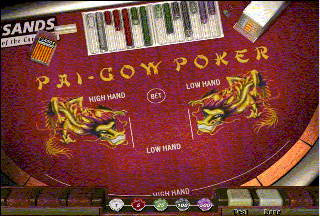Play
To Win
Tips and strategies to help make you a winning casino player Game
Rules
Learn: Blackjack, Baccarat, Craps, Roulette, Slots, Video Poker, Pai Gow Poker
Systems Gallery
Win more, more often with proven betting methods from the systems gallery
Order Form
A secure on-line order form to purchase
products advertised by Let's Talk Winning.
Playing Online
All about gambling at online casinos. Find out where the best deals are
Links
and Things
Sign our guestbook, refer a friend, link to other gambling sites
Newsletter
Read the current edition of our weekly newsletter. Get a free subscription
On-Line Forum
Post a gambling question or opinion - get an
answer . . .
 Wanna Win At Slots? Click
Here! Wanna Win At Slots? Click
Here!






|
=================================================
Friday, December 8, 2000
How you play to win Pai Gow Poker.
Pai Gow is a Chinese game of dominoes. Pai Gow Poker is the marriage
between Pai Gow and a 7-card Stud Poker.
The goal of Pai Gow Poker is to make two poker hands that beat the banker's hands. The
player is dealt 7 cards that he/she sets into a 5-card hand (high hand) and a 2-card hand
(low hand). Skill is involved in setting the two hands, which will help reduce the casino
edge to about 3%. The hands are played and ranked as traditional poker hands except A2345,
which is the second highest straight, and the 5-card hand must be higher than the 2-card
hand. One wins, if both hands are better than the banker's hand. One loses, if both lose.
Otherwise it's a push. The banker wins absolute ties (i.e. KQ vs K Q). The game is played
with 52 cards and a Joker. The Joker can be used as an Ace or to complete a flush or
straight. The table layout has 7 spots - one in front of the dealer and 6 for players.
Each player spot has spaces for a bet, low hand, high hand and sometimes the house
commission. The dealer deals 7 7-card hands in front of the chip tray. The banker can be a
player, but is usually the house. The banker designates which hands go to which player by
shaking a dice cup with three dice. The banker's position is either 1, 8 or 15 and the
hands are passed out counter-clockwise. So, if the dealer is the bank and the dice total
to 6, player 5 gets the first hand, player 6 gets the second, the dealer gets the third
and so on. The dice rules are only ritual - you don't need to worry about anything until
you get your hand.
The player puts the 2-card hand face down in the box closest to the dealer, and the five
card hand face down in back. Once everybody has set their hand, the dealer turns over and
sets the bank's hand. The dealer goes counter-clockwise around the table comparing the
banks hand to the players, and taking, paying, or knocking. There is a 5% commission on
winning bets that you can either put out next to your winning bet, or the dealer will
subtract from your payoff.
In Pai Gow Poker, the only strategic decisions are how much to bet and how to set your
hand. The simple basic strategy for setting your hand is to make the highest 2-card hand
that is less than your 5-card hand. If you can't figure out what to do, you can show your
hand to the dealer and they will tell you how the house would set it. Since pairs
generally win the 2-card hands, and two-pair wins the 5-card hands, the only difficult
decisions are when to split two pairs.
The player may want to play as the bank. The House Dealer or the player may be the banker.
The Bank wagers against all players. The bank will alternate between the house and the
player (the House Dealer will at least take the bank every other hand). The BANKER will be
designated by a white plastic marker. A Bank Player must either cover half or all wagers
against him/her. The House will co-bank at 50/50 only at the Bank Player's request. The
hand will be set according to house way and the table limit will apply
if the House acts as a co-banker. In order to bank, a player must have played the previous
hand against the House. The House will wager a sum equal to that player's wager against
the house the previous hand. The player may request that a smaller amount be wagered. A
Banker must be bank at the same spot of the hand he previously played against the house.
Those rules seem a bit more complicated than in Baccarat, don't
they?
Otherwise, Pai Gow Poker is an easy game to play, and since
each hand takes a while to play (dealer has to shuffle for each game) and most hands push,
you can play on $20 at a $5 table for quite a while.

You can play Pai Gow Poker also on-line at Sands of the Caribbean Casino.
Sands has been ranked the number 1 on-line casino for many months. If you vote for
Sands through Gambling.com, Sands will give you $10
free if they're elected number 1. If not, you will still get $5 for just having voted for
Sands. This is additional to $25 bonus you receive every month on a deposit of $50.
Don't forget, Sands of the Caribbean is
still giving away 4 Porsche cars during December each week. For each $2,500 in
casino wagers (excluding wagers on sporting events) you make during the week (from Monday
until Sunday) you'll receive an entry in the drawing.
Why Banker is favored playing Baccarat.
As you may know, the player can place his/her bets on either the Banker or the Player in a
much simpler way than in Pai Gow Poker described above. If you are not acquainted with the
rules of Baccarat, you can find them free at: http://www.letstalkwinning.com/bacrules.htm.
Except for the tie bet, Baccarat has a very low house edge - 1.36% if you bet on Player
and 1.17% for bets on Banker. This difference is due to the third card drawing rules and
on what circumstances the Banker does not need to draw a third card. At those
circumstances, the Banker is already at an advantage, and not having to draw the third
card, makes the Banker the winner.
The third card drawing rules for the Banker are the following:
The Player stands if the first two cards total 8 or 9. If they don't total 8 or 9, then
the Banker has to draw a third card, when the Banker's first 2 cards total a 3.
If the third card of the Player is between 2 and 7, then the Banker draws a third card
when the Banker's first 2 cards total a 4.
If the third card of the Player is between 4 and 7, then the Banker draws a third card
when the Banker's first 2 cards total a 5.
If the third card of the Player is either 6 or 7, then the Banker draws a third card, when
the Banker's first 2 cards total a 6.
Notice that if the Banker totals a 5 and the Player is totals a 3 for instance, according
to the third case above, the Banker doesn't need to draw a card, as it's already winning
the bet. Drawing a third card could put the Banker in a lower total than the Player should
it exceed the 10.
So, the game is designed to favor the Banker. Indeed, Izak has devised his famous Progressive Baccarat systems, taking advantage of this feature. One
of his 3 systems bets only on the Banker varying the bet amounts in such a way to make it
a winning system, despite the 5% commission that the casino takes when the Banker wins.
You can read more about Progressive Baccarat at http://www.letstalkwinning.com/progbac.htm.
The holiday season is approaching. Some
on-line casinos offer great drawings during the holidays. One, which particularly stands
out, is the $20,000 drawing offered by Challenge Casino.
For every $50 deposit you make and wager, you will automatically receive an entry in the
Christmas Lottery. 66 players who have an account with Challenge Casino are
guaranteed to win a prize.
They also have a great bonus program:
At your first deposit of $30, you will get a 100% welcome bonus of $30.
Starting from your second deposit you can get 10% free chips to play at Challenge Casino. You can
accumulate and receive your 10% free chips twice a week, on Monday and Friday. You can be
eligible to earn as much as $100 free chips per week.
A 3 step Martingale and comps at the
University.
On the first day of college, the Dean addressed the students, pointing out some of the
rules. "The female dormitory will be out of bounds for all male students, and
the male dormitory to the female students. Anybody caught breaking this rule will be fined
$25 the first time."
He continues, "Anybody caught breaking this rule the second time will be fined $50.
Being caught a third time will incur a hefty fine of $100. Are there any questions?"
At this point, a male student in the crowd inquired: "How much for a season
pass?"
WOULD
YOU LIKE TO SUBSCRIBE? |

If you missed any
newsletter, click here for an archive.

|
|
 Let's Talk Winning
Let's Talk Winning